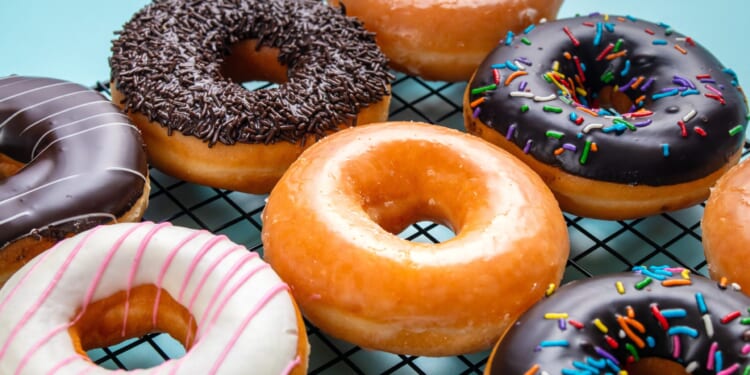Donut sales in America are up — way up. Nearly $4 billion worth of fried dough changed hands last year, proof that no matter how many diets come and go, no matter how many oat-milk smoothies promise enlightenment, Americans remain gloriously loyal to their sugary circles. In an age of kale chips and conscience, the donut has become a quiet rebellion. A glazed middle finger to moderation.
The donut is circular because the craving never ends. Eat one, swear it’s the last, then start the cycle again.
And I get it. I could mock the addiction, but that would make me a hypocrite. This isn’t mockery. Quite the opposite, in fact. It’s admiration — an ode to the loyal circular.
I grew up in Ireland, where donuts were more punchline than pastry. They were dense, dry, and dusted with despair. You bought one mostly for comic effect, the way you might buy a rubber chicken. Then, at seventeen, I came to New York. I was a pale boy with big dreams and a bigger appetite. Within hours, I’d discovered real pizza, the Cheesecake Factory, and, most fatefully, the American donut.
My first was a glazed Krispy Kreme. I remember the bite — soft, warm, faintly holy. It wasn’t food. For me, it was revelation. Ireland had given me poetry, but America gave me pleasure. I returned home rounder, happier, and suspiciously evangelical about icing.
Americans don’t eat donuts for energy. They eat them for emotional stability. Coffee might keep them awake, but donuts keep them alive. Together, they’re the fuel that powers capitalism — the breakfast of believers in both God and the free market.
You can trace a nation’s mood through its bakery aisle. When times are good, people flirt with novelty — maple bacon, matcha glaze, lavender drizzle. When times are rough, they run back to the classics: plain ring, powdered, chocolate frosted. Stability you can eat. It’s no wonder the industry’s booming while everything else wobbles.
Donuts used to be simple; now they’re edible art. There’s the “Biscoff Cocoamazing” — a Belgian chocolate-topped, cookie-butter-filled donut that sounds less like breakfast and more like coping in confection form. Krispy Kreme teamed up with Dr Pepper, Dunkin’ flirted with watermelon jelly, and somewhere a marketing executive whispered, “What if we made Pop-Tart donuts?” and nobody stopped him.
It’s chaos, but beautiful chaos — innovation through indulgence. America may not build cathedrals anymore, but it still builds donut empires.
Back home, people now boast about “artisanal donuts.” They cost more, weigh less, and taste like irony. You’ll find them in cafés where people discuss mindfulness while licking frosting from their fingers. But they’ll never match the American originals. Only here could a pastry be both humble and heroic — bought by cops at dawn, CEOs at noon, and teenagers at 2 a.m. The donut doesn’t discriminate. It’s democratic fried dough.
I’ve come to believe every donut tells a story. The jelly-filled is optimism — messy but rewarding. The Boston cream is ambition — thick, rich, slightly over the top. The plain glazed is stoicism — simple, reliable, unsung.
People often say America’s problem is excess. I disagree. Excess is its superpower. The same impulse that builds rocket ships also builds donuts with cookie butter and sea salt. Moderation never built an empire, and it certainly never invented sprinkles.
Whenever I return to the States, I tell myself I’ll behave. I’ll eat salads, jog along the Hudson, perhaps detox. Then within 24 hours, I’m in a diner, shades on, hood up, ordering “just one.” The waitress asks, “You want it warmed up?” I say yes. Because every sinner deserves a second heating.
What fascinates me most is the donut’s permanence. It hasn’t been canceled, rebranded, or digitized. You can’t download a donut or swipe right on one. There’s no “donut drop” in the metaverse, no limited-edition NFT baked for the algorithm. To enjoy it, you have to do something almost radical: leave the house, touch it, risk the sugar on your sleeve and the shame on your soul. It demands presence, not pixels — an act of faith in flour and fat. Take it in hand, feel the weight and the warmth. That’s intimacy no simulated sweetheart could ever fake.
And that’s why sales keep rising. Donuts are more than nostalgia — they’re resistance. They remind people that base-level bliss doesn’t need justification. The French may have croissants, the Italians tiramisu, the Japanese mochi, and the Turks their syrup-soaked baklava. But only America had the audacity to deep-fry desire and eat it at 7 a.m.. While others perfected delicacy, America perfected decadence — a kind of gleeful gluttony that turned sweetness into a civic duty.
The donut is circular because the craving never ends. Eat one, swear it’s the last, then start the cycle again. It’s basically Buddhism in batter form. Desire, indulgence, regret, repeat. Philosophers chase meaning; pastry chefs solved it centuries ago. Life, like the donut, offers no straight lines, only loops of longing laced with the little lies we tell ourselves.
So yes, donut sales are soaring. Of course they are. America runs on them — literally and metaphorically. In a nation that keeps reinventing itself, the donut remains steadfast: sweet, sticky, and slightly scandalous. And if loving that makes me part of the problem, I’ll take another dozen.
READ MORE from John Mac Ghlionn:
Is the Right Pining for Racial Purity?








![Florida Officer Shot Twice in the Face During Service Call; Suspect Killed [WATCH]](https://www.right2024.com/wp-content/uploads/2025/12/Inmate-Escapes-Atlanta-Hospital-After-Suicide-Attempt-Steals-SUV-Handgun-350x250.jpg)
![Keith Ellison Caught Promising to Fight State Agencies for Somali Fraudsters [WATCH]](https://www.right2024.com/wp-content/uploads/2026/01/Keith-Ellison-Caught-Promising-to-Fight-State-Agencies-for-Somali-350x250.jpg)







